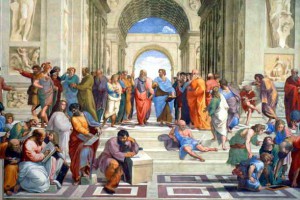Stoicism originated in ancient Greece in the 3rd century. B.C. The founder of the philosophical school was Zeno of Citium. Proponents of this theory gathered in the gallery with columns in Athens, which was called Stoya (Greek. Stoya-portico). Stoicism is divided into three periods: Ancient Stoya (3-2 century BC. E.) The average Stoya (2-1 century BC.) Late Stoya (1-2 century AD.)
According to the Stoics space is a living being who created all life on earth. Stoicism attributed to the philosophy of logic, physics and ethics, teaching about the nature of knowledge and thinking about the proper life. The most important virtues for them was overcome passion, strength and stability of mind and conduct moral life. Desirable health, beauty and wealth, and unwanted, illness, death or poverty.
Stoic doctrine of virtue is paradoxical. The most important of them are presented in the treatises of Cicero’s “On the paradoxes of the Stoics” and Plutarch “Oh contradictions stoic.” One of the ironies is moral concessions and his inner motivation. The moral person is independent sector. The representatives of this philosophy believe that evil or good can be only that moral choice depends on the person, his virtuous or vicious soul. That moral concessions can be vicious, depending on the motivation of action.
Ideally, corrective action should be subject to proper installation. Cicero cited an example: “… if it is true turn taken in storage is the right thing, in this case turn taken in storage – refers to the concept of duty, because of the accession words true it is doing the right thing, it is in itself a return is the concept of debt” .
Cicero also at work “Paradoxes of the Stoics,” says the admissibility of parricide, following the example of the inhabitants of Sagunto “… who prefer to have their parents died free, not slaves were left to live … So sometimes you can take the life of his father, not committing this crime. ” Actions such as suicide, murder of his father and others. hard to believe natural in terms of socio-biological nature of man. The result is paradoxical situation: the material virtuous actions may be something that is taken by itself, is not value in terms of nature, however, most of these actions are not contrary to nature and do not lead to its self-destruction.
Epictetus formulates what stoic harmonize with nature: “As long as I do not clear the following, I always stick to more natural to achieve that nature. After all, God himself has made me able to choose this. And if, of course I knew that now I determined the fate of the sick, and I was drawn to this. After all, the foot if it had a mind to be stretched in order to walk in the mud. “
Until we know that death is determined, followed her and try to avoid health. This corresponds to human nature, which has no knowledge of the sage, respectively, and actions will be correct. But if the disease is judged to strive for health – means to go against the cosmic order and personal nature.
There is another paradox: the presence or absence of virtue can be recorded and shown to the outside. No action that we could confidently call virtuous or vicious, there is no specific characteristics that would distinguish between them. Actions by virtue are not only different from “legal” concessions and sage can perform actions that are externally indistinguishable from acts of violent scoundrel.
Virtuous even setting allows you to turn them into perfect moral action. Once again we turn to saguntians example, during the siege of the city killing their parents, so they do not fall into slavery. In itself, this act – parricide, that pursues a goal nasty human nature. But he is virtuous, according to the Stoics, and it is that made in extreme circumstances, and at the very moment in which the danger was already inevitable.

